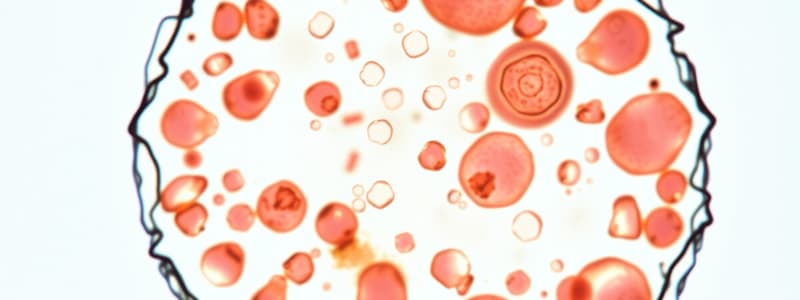Podcast
Questions and Answers
Who is recognized as the English Father of Microscopy?
Who is recognized as the English Father of Microscopy?
- Hans Janssen
- Antonie van Leeuwenhoek
- Robert Hooke (correct)
- Zacharias Janssen
What did Robert Hooke actually observe when he discovered the cell?
What did Robert Hooke actually observe when he discovered the cell?
- Live bacteria
- Dead plant cells (correct)
- Animal cells
- A single-celled organism
What significant contribution did Hans Janssen and Zacharias Janssen make to microscopy?
What significant contribution did Hans Janssen and Zacharias Janssen make to microscopy?
- Developed the first compound microscope (correct)
- Discovered bacteria
- Invented the eyepiece lens
- Created the first telescope
What was the appearance of the cell as observed by Hooke?
What was the appearance of the cell as observed by Hooke?
What is the main function of the eyepiece lens in a microscope?
What is the main function of the eyepiece lens in a microscope?
Flashcards are hidden until you start studying
Study Notes
Learning Objectives
- Understand the three fundamental postulates of cell theory: All living organisms are composed of one or more cells, the cell is the basic unit of life, and all cells arise from pre-existing cells.
- Identify the structure and roles of major organelles (like the nucleus and mitochondria) and subcellular components (such as ribosomes and endoplasmic reticulum).
The Early Microscope
- Hans Janssen and Zacharias Janssen invented the first compound microscope, combining two lenses for enhanced viewing.
- The eyepiece lens magnified the image, while the second lens was positioned near the specimen for improved observation.
- This design laid the foundation for modern optical microscopy.
17th Century Microscopes and the Discovery of the Cell
- Robert Hooke advanced microscope technology further and is celebrated as the English Father of Microscopy.
- He observed and named the cell, derived from the Latin word "cella," meaning small room, due to the compartment-like appearance of cork.
- Hooke's observations were of non-living plant cells, marking a pivotal moment in the understanding of biological structures.
Studying That Suits You
Use AI to generate personalized quizzes and flashcards to suit your learning preferences.




